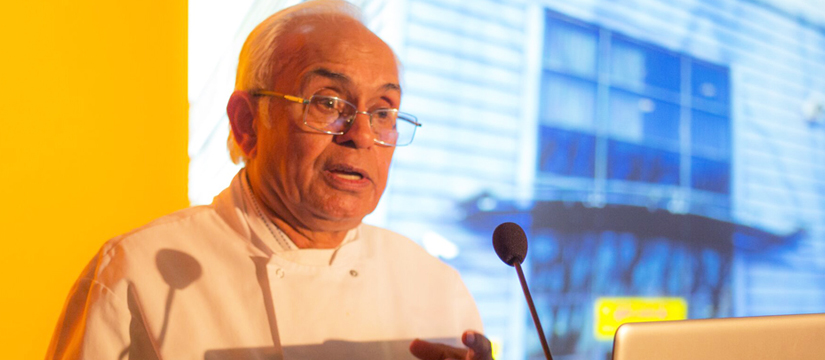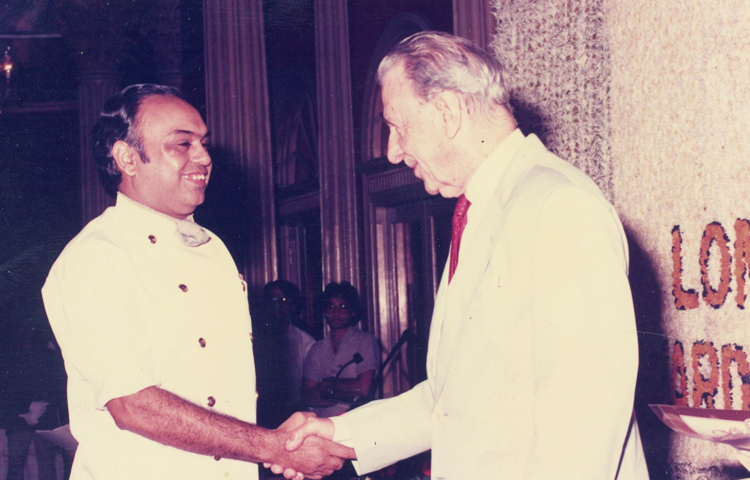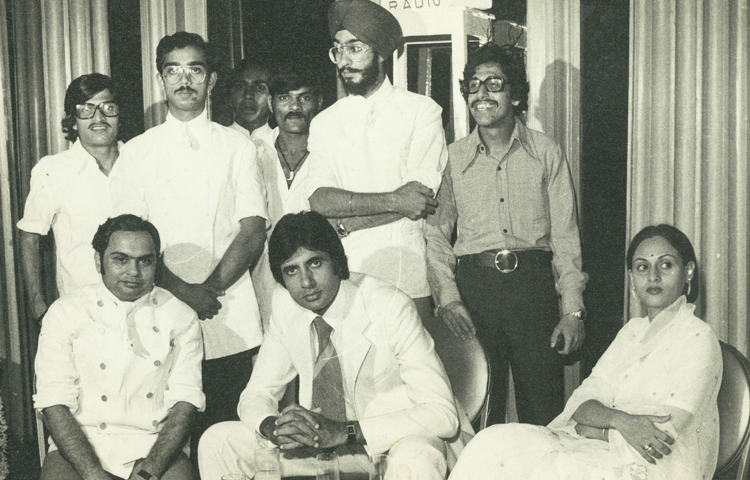

Lifetime Achievement Awardee from Curry Club of England, Star Group, Hospitality Leaders Choice UK, and Food Food TV Channel, Satish has designed kitchens and menus of over fifty five-star kitchens of Taj Hotels worldwide. His recipes are still treasured and used in those kitchens. He was declared one of “the world's 20 best chefs” in 1991. At the age of 26, he took over the reins of the kitchen in the landmark Taj Mahal Palace Hotel, Mumbai, as the world's youngest chef in a five-star kitchen. In an exclusive interview, he shared his views on Kitchen. Excerpts.
What is your first impression when you hear the word 'Kitchen'?
The word “Kitchen” brings a big smile to my face and a feeling of belonging.
What is the importance of the kitchen in your day-to-day life?
Food is a basic necessity. At home, we give a lot of emphasis and interest in deciding on our daily menus across all three meals. Even though my wife is the boss at home I still take the liberty to share my ideas and cravings for any particular dish that I would like to eat. I love to be involved in deciding the menu for the day. This is my happy space.
What do you have to say about the gradual development of the concept of working kitchen when you started your career and now?
Change is constant and it is for everything around us including the working kitchens which have evolved over the years. In my early days as a chef, the majority of the equipment was gas-operated. We were gradually introduced to steam-operated equipment which in itself was a luxury and today chefs can use induction hobs which is amazing. Technology has advanced. I am privileged to experience this change over the past five decades. Science as well as evolving technology has played a very major role in this evolution. Some examples of this evolution are demonstrated by the concept of blast chilling & blast freezing food for improved shelf life, sous vide cooking, micro encapsulation of flavors and microwave cooking.
In my early days we would have to peel sacks of onions now we have onion peeling machines. Ovens have wicked technology to record core temperatures and multiple cooking combinations…. I can go on and on.
What is the most challenging job in the kitchen in your opinion?
Standardization of recipes and cooking processes for me has been the most challenging job in the kitchen. People shy away from capturing recipes and measuring ingredients leading to the inconsistent outcome of products.
How do you maintain hygiene and cleanliness in the Kitchen?
Hygiene and cleanliness form an integral part of running a kitchen operation. You can cook the best of the best meals using the best ingredients but if they are not safe to eat it defeats the purpose. GMP ( Good Manufacturing Practices ), training, correct application of cleaning chemicals, and clean as you go policy are followed diligently across all my kitchens.

Tell us about the safety features of your kitchen.
The kitchen environment is prone to accidents. Safety features in all my kitchens include basics from anti slip floor, ingress proof electrical switches. SOP (Standard Operating Procedures) for all equipment's which clearly define and demonstrate the dos and don'ts of using all heavy duty equipment's in the kitchen.
Which method of cooking do you pursue in your kitchen, traditional or modern?
I am a strong believer in traditional methods of cooking as I spent a major part of my working career exploring different parts of India in learning multiple cuisines from different regions as well as traditional ways of cooking using a different methodology. Having said that, my thought process has changed with times and I believe in a balanced approach where modern methods of cooking end up bringing out the flavours of certain dishes better than traditional cooking.
Do you have a penchant for using new technology gadgets in your kitchen? Have you added any lately?
During my tenure as Executive Chef of The Taj Mahal Hotel Mumbai, I had full support from the management to invest in technology and be forward- thinking. I would especially make a minimum of two trips a year overseas to keep appraised with new trends and gadgets. As I am retired now the last gadget I got for my home kitchen is an air fryer.
Describe the role of the trained staff in your kitchen? Do you face any specific challenges in hiring the desired staff?
Trained staff for me is worth gold. They are the custodians of the legacy of any working kitchen. Hence I have always given a lot of importance to training and depended more on developing an internal pool of talent rather than depending on the market.
Frozen foods are becoming popular now-a-days. What are your views on Frozen Foods?
I have always championed frozen food. The acceptance of frozen has seen an extraordinary jump during COVID as there has been a major shift in lifestyle. Frozen meals if produced using the correct methodology & technology is in many aspects better than chilled food. Once you freeze food you are seizing the natural breakdown as well as retaining the nutritional value.
What are the essential health and lifestyle trends prevailing now-a-days that you like to incorporate in the kitchen?
These days what I see and hear around me is very health conscious Gen Z kids who are very health conscious and are trendsetters. Keto diets, vegan food, and plant-based alternate proteins are the trend these days according to me.
More and more people are becoming calorie-conscious. Keeping the statement in mind, what are the dessert trends followed in restaurants?
People with a sweet tooth will never compromise on their desserts. Chefs are thinking out of the box and creating desserts with sugar alternates using fresh fruits purees, honey, and jaggery which are healthier as compared to refined sugar. Yoghurt based desserts are very much on trend and a great healthy option.
Ingredients play an important role in food preparation. Do you prefer using local ingredients in your preparations? How do you select the vendors?
You are spot on by saying that. The success of a product is largely dependent on the quality of its ingredients. Over the years I developed local suppliers who eventually formed a very dependable eco-system for our supply chain. I select my vendors based on their ability to provide consistent produce, act quickly with solutions in challenging situations, and the ones who work as partners and not suppliers.
Which are the upcoming cuisines in focus?
Plant-based food is on trend, pickling and fermenting, home-made pasta have been extremely popular during covid the trend continues these are more of concepts than cuisines. Cuisine wise Japanese food & Peruvian are gaining more popularity than Italian Thai & Indian cuisines.
Do you agree that there is a need to change the curriculum of culinary courses in India?
Absolutely. I feel our curriculum has been stagnant for the past decade and needs to be revisited for sure with a more international approach as well as an emphasis on Regional Indian flare.

What are your views on framing the curriculum designed especially for Indian food?
Indian food has not been explored to its fullest. Curriculum introducing the students to the traditional cooking techniques beyond the popular ones like tandoor should be explored. India has an abundance of raw materials and ingredients which are confined to specific regions. These need to be brought to the main stream. The medicinal value of Indian herbs and spices in my view should be part of the curriculum. Another important area of emphasis should be meal presentation as presenting Indian cuisine beyond traditional utensils has been a challenge.
India is extremely diversified where-as its food culture is concerned. What according to you is the scope of popularizing Indian regional cuisines across the globe?
Indian cuisine is globally recognized but has been limited to specific regions with North Indian food being the most widely accepted. A good starting point for introducing regional Indian cuisine into the main stream is by bringing awareness. A strong way of doing that is by introducing it into the curriculum. This would give a solid foundation to budding chefs who can be our ambassadors and be instrumental in bringing the change and acceptance of Regional Indian food globally.
How do you define your 'Dream Kitchen'.
My dream kitchen would surely have an abundance of natural light with a glass ceiling and a herb garden as I get very inspired by nature. An interactive island counter with in-build hobs and sitting arrangement will further make it a very casual dining set up. Gadgets would include table top sous-vide bath. I am intrigued by cryogenic cooking gadgets, under table blast freezers & chillers, dehydrators, and fermenters besides other regular equipment. Learning never stops and my kitchen would clearly reflect that.
